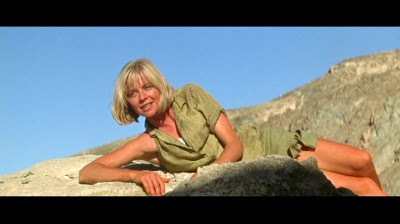 |
| Miles and miles of nothing but sand. |
The cast may not be A-list, but they all do a nice job. The biggest star is Stanley Baker, who also produced the film. As injured Mike Bain, he correctly reads O'Brien before anyone else, sensing the man's dangerous side. Theodore Bikel is a doctor with low self-esteem who finds himself on the wrong end of one of O'Brien's threats. At one point, he and Bain help O'Brien hunt and kill an antelope that provides some needed protein for the stranded group. It's a brutal scene by inference--none of the actual violence is shown on screen--but you get the picture clear enough. The scene is important as it serves to show that man can hold his own against nature in some circumstances, and, of course, that no peaceful animal is safe when the top of the food chain has a rifle and rocks.
Harry Andrews is Grimmelman, an old man with some useful knowledge when it comes to edible native plants. He becomes expendable as O'Brien reasons that one less mouth to feed makes sense. His character is a likable figure here, and a far cry from another one he played that same year. A busy British character actor of the period, Andrews had four films to his credit in 1965. In The Hill he is as a sadistic staff sergeant at a military prison where he makes Sean Connery run up a hill in camp over and over under the brutal sun.
Director Enfield includes some terrific shots of the environment. Besides the baboons, whose growls and shrieks would raise anyone's heart beat, the best may be the brilliant orange sun shown over the opening credits. There are also several scenes that give one a great appreciation for how vital water is for survival in such a place.
And of course, Enfield uses his camera to give the audience plenty of shots of York. After all, this is primarily a guy's picture. As Grace Munkton she's almost a silly and pathetic character, who for a time, is more attracted to machismo than sense. As the only woman in the group, she becomes the ultimate prize for the dominate male. And seeing how she holds up in the heat, it's easy to understand how a man like O'Brien would look twice. But he may be more affected by the sun than the rest, as he seems more interested in shooting baboons in a display of dominance, telling Grace that he only wants what he doesn't already have.
Whitman, a limited actor who handled action roles well, does adequate work here. He's not supposed to be sensitive or particularly display nuance in his character, and he doesn't. Obsessed with the surrounding baboons, his decisions and fate seem predictable. I suppose the end is open to interpretation, though I think it's clear what will happen. In any case, it's a wonderful shot, filmed from a distance, dramatic and inevitable.
 |
| Susannah York as Grace. |
 |
| Stuart Whitman as Brian O'Brien, a man who lives by instinct. |
As an African survival film, I like this one more than another produced that same year: Flight of the Phoenix. The latter certainly had a bigger budget and a better cast, including James Stewart, Richard Attenborough, Hardy Kruger, Ernest Borgnine, and Dan Duryea, but the premise is considerably more far-fetched.
Enfield had worked with Baker on another African film, the excellent Zulu (1964), which tells the story of British soldiers fighting Zulu warriors at Rorke's Drift. He also directed The Mysterious Island (1961), a somewhat fantasized take on the Jules Verne's novel.


The landscape looks amazing - love that red sand! I'm not sure I'll rush out to see this movie, but I really enjoyed your review.
ReplyDelete